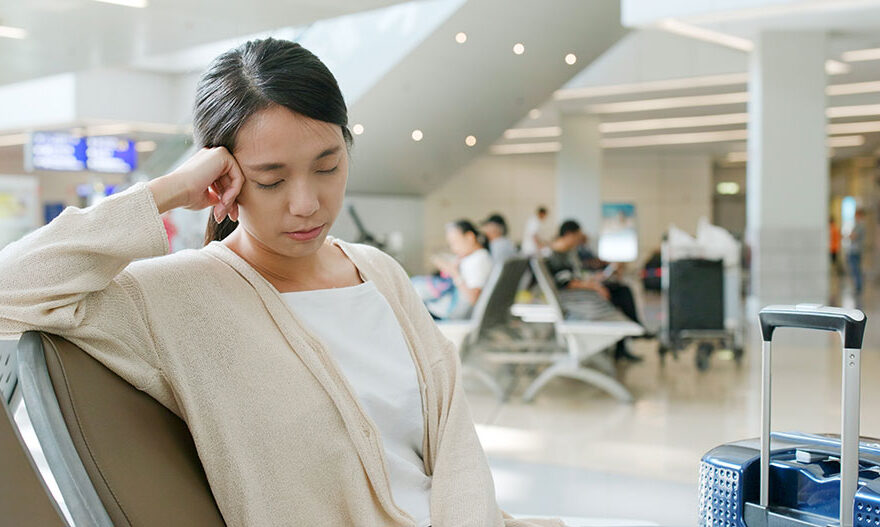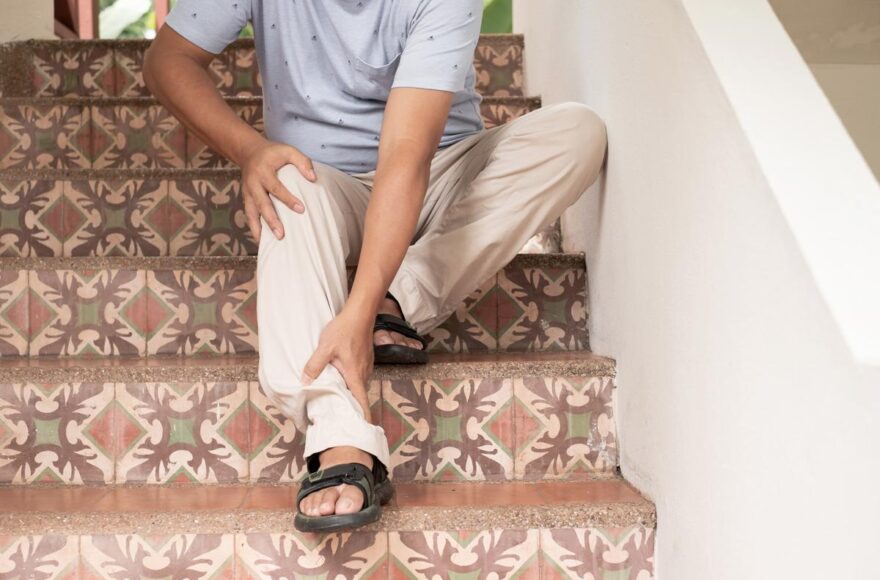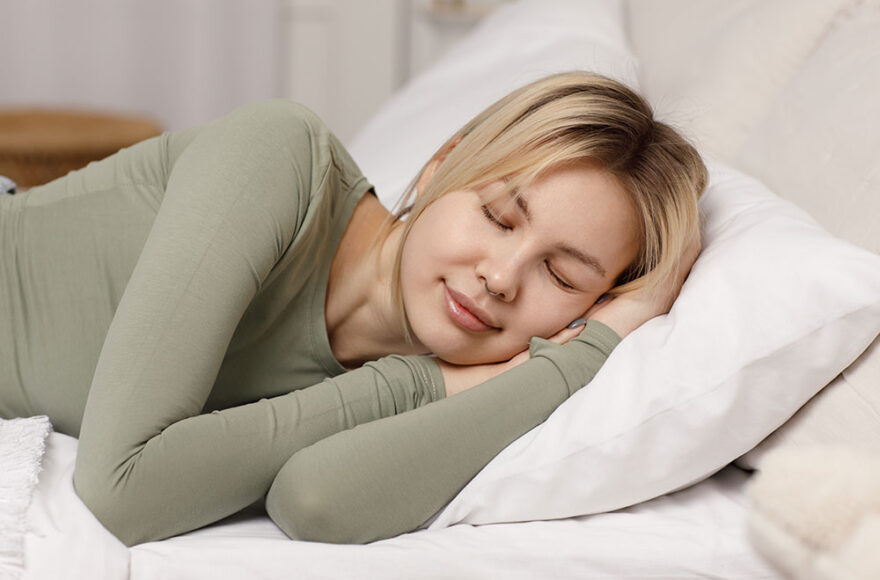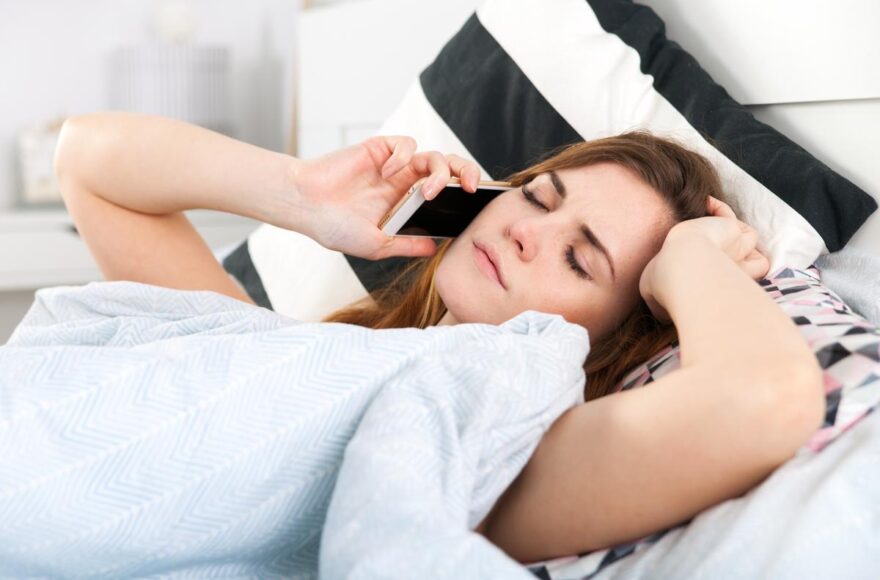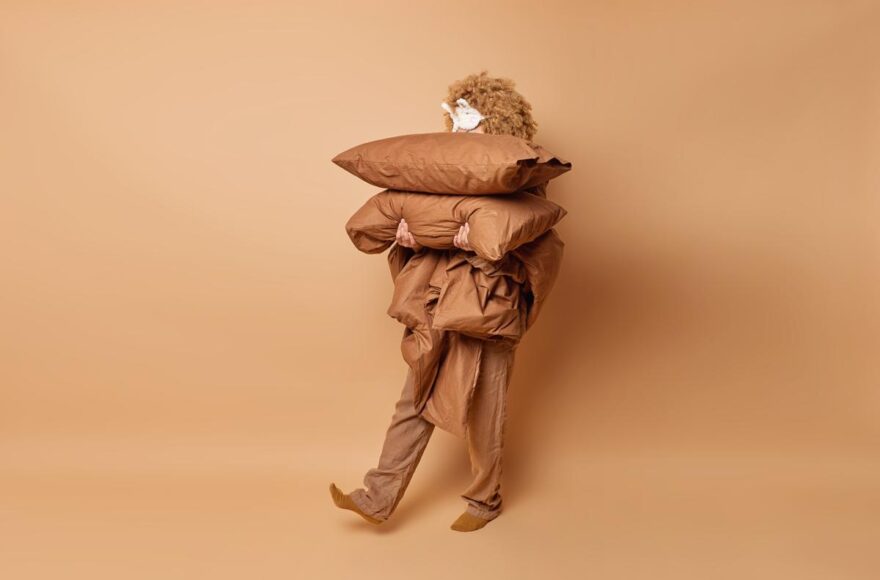25 Best Tips for Better Sleep at Night
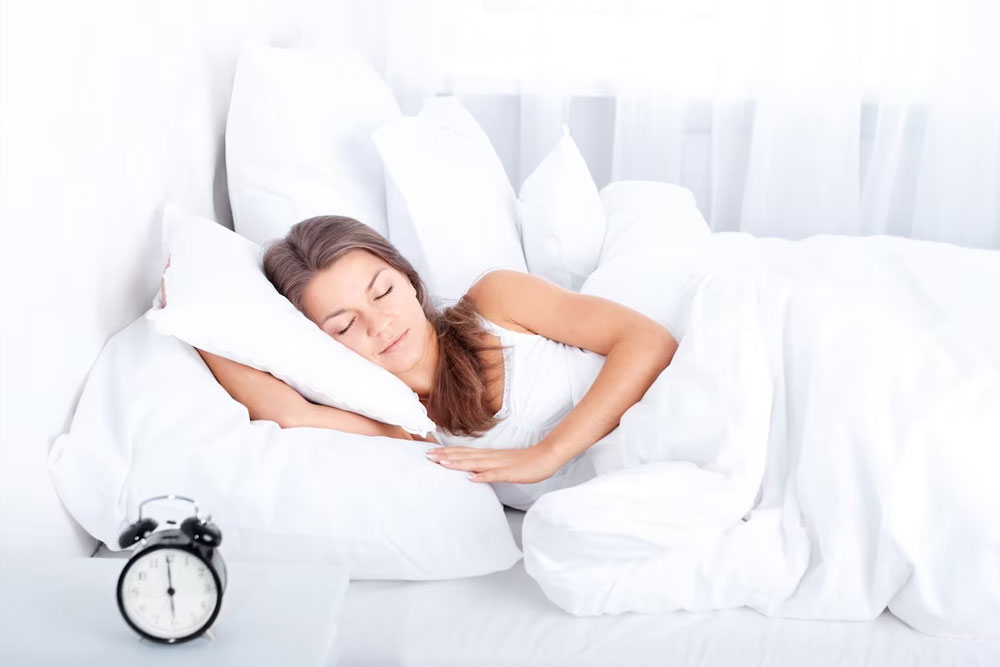
Table of Contents
- Overview
- 1. Avoid blue light in the evening
- 2. Increase your exposure to daylight
- 3. Take short naps early in the morning
- 4. Block your clock view
- 5. Avoid long daytime naps
- 6. Place a pillow between your leg
- 7. Sleep and wake up at the same time
- 8. Choose your pillow wisely
- 9. Control your bedroom environment
- 10. Dim lights in the evening
- 11. Reduce the noise
- 12. Set your bedroom temperature
- 13. Seal your mattress
- 14. Keep your pet away from your bed
- 15. Work out regularly
- 16. Look for hidden caffeine
- 16. Eat on time
- 18. Drink wisely in the evening
- 19. Don’t drink too much water before bedtime
- 20. Quitting smoking can improve your sleep
- 21. Free your mind before bedtime
- 22. Save your bed for sleep and sex
- 23. Take a melatonin supplement
- 24. Use caution with sleeping pills
- 25. Know when to see your doctor
Sleep is vital for overall health. However, some factors can affect your sleep quality and keep you awake. Here we share the 25 best tips for better sleep at night.
Overview
Sleep! is one of the essential systems of our body that keeps us healthy and relaxed. It is vital for our body and its organs. Less or poor sleep can cause different health issues. Sleep affects the following:
- Mental Health
- Heart Health
- Brain Health
- Immune system strength
- Stress levels
- Inflammation
- Energy
- Weight
You fall asleep when your brain secretes a sleep hormone (melatonin). Circadian rhythm tells your brain when to secrete this hormone. It is a natural time-keeping clock of our body. Several factors can make this clock work properly. If something interrupts this clock, it causes less sleep hormones.
As a result, you may have difficulty to fell asleep. It may be light, temperature, alcohol, smoking, or diet. But with some lifestyle changes, you can improve your sleep quality and duration. Read on to learn how to change your restless nights into a peaceful one.
1. Avoid blue light in the evening
Avoiding blue light exposure in the evening may help you to get better sleep quality. This blue light may come from your tablet, cell phone, or digital clock on your bedside table and may hurt your sleep. Light is beneficial during the daytime but vice versa at night. Light may reduce the secretion of sleep hormone( melatonin).
Tip
Here are the best tips for better sleep.
- Turn off TVs and computers an hour before you go to bed.
- Cover any displays you can’t shut off.
- Use glasses that block blue light or apps while using a laptop or cell phone.
2. Increase your exposure to daylight
Daylight or sunlight significantly affects your body. It affects your natural time-keeping clock, known as the circadian rhythm. It helps to keep us awake and tells the body when it’s time to sleep. Circadian rhythm has a significant impact on sleep hormone secretion. Daylight can keep your circadian rhythm healthy, which helps you get deep sleep quality. Also, it improves daytime energy.
Tip
Here are the best tips for better sleep.
- Let the light come into your home through windows.
- Install artificial bright light devices or bulbs.
- Having outdoor activites.
3. Take short naps early in the morning
Taking a short nap early in the morning may help get better sleep quality. This short nap of 20 minutes or less early in the day helps you reduce long daytime naps. It may cause an afternoon slump. Afternoon slumps can cause mood swings, cravings, and loss of focus.
Tip
You can overcome to afternoon slump with the following:
- Take a short walk.
- Drink a glass of ice water.
- Do a phone call to your friend.
4. Block your clock view
You may have a habit of looking at the clock at night. It may disturb your sleep and keeps you restless. Your mind will race with thoughts about the day to come. It makes you awake in the middle of the night.
Tip
Here are some helpful tips for better sleep quality.
- Put your alarm clock in a drawer.
- Turn it away from sight.
5. Avoid long daytime naps
Long daytime naps can make you awake at night and disturb your sleep. Daytime sleep can confuse your internal clock and makes you struggle to sleep at night. Studies show longer daytime naps for more than 30 minutes can harm brain function. This can affect your sleep quality. But some people who are used to regularly longer daytime naps are good sleepers at night. It only troubles you when you take irregular, longer daytime naps.
Tip
Make your habit of taking power naps instead of longer daytime naps.
6. Place a pillow between your leg
Lower back pain can cause severe pain to wake you up and disturb your sleep quality. You may get this pain due to your busy routine or sitting all day on a chair in the office. Your lower back feels hurt at night when you lie on your bed. It keeps you restless and awake. To treat this, you can put a pillow between your legs. It helps reduce stress on your lower back and lets you sleep peacefully.
Tip
Place a pillow under your knees; it helps you relieve the pain.
7. Sleep and wake up at the same time
Set your body clock and try to sleep and wake up time same. However, it can be challenging to do sometimes, especially on weekends. But make your routine even if it’s a weekday or weekend.
If your sleep and wake-up time are the same, your body and brain will set a loop. Your body and brain align themselves with sunrise and sunset. You can nod off quickly and sleep soundly through the night.
Tip:
Be in the bright light for 5 to 30 minutes as you wake up. Light tells your body it’s time to wake up.
8. Choose your pillow wisely
You may wake up stiff neck after taking restful sleep. You can blame your pillow, which should be of a perfect size, not too fat or flat. Your pillow can support the natural curve of your neck when resting on your back. Do not sleep on your stomach. It will twist your neck. And if you sleep on your side. Do line your nose up with the center of your body.
Tip
Take a good posture before bed. Don’t crane your neck to watch TV.
9. Control your bedroom environment
Your bedroom environment can significantly impact your sleep quality and duration. Control factors like:
- Temperature
- Noise
- External lights
- Furniture arrangement
You can have a long peaceful sleep. It also affects your overall health.
Tip
Here are the best tips for better sleep quality.
- Try to minimize external light and noise.
- Make your bedroom a quiet and relaxing, and enjoyable place.
10. Dim lights in the evening
This is one of the best tips for better sleep quality. Make a habit of using dim light around your home for 2 to 3 hours before bed. Dim lights signal your brain to secrete the sleep hormone (melatonin). This hormone makes you sleep all night peacefully.
Tip
If you want to read in the last hour before bed. Use a 15-watt bulb.
11. Reduce the noise
External noises such as faucet drips, nearby traffic, or a loud dog can chip away your sleep. And if you are a parent, you might suffer sleepless nights too.
Tip
Here are the tips for better sleep and reducing external noise, you can use:
- A fan.
- An air conditioner.
- A white noise app or machine.
- Earplugs.
12. Set your bedroom temperature
Your bedroom temperature can affect your sleep quality and duration. For example, if you live in a very hot place, you may have restless nights during summer. And vice versa in winter when you live cold place. The sleep temperature for most people is between 68 and 72 degrees.
Tip
Try different temperatures between 68 and 72 degrees. You will find out the best one for you.
13. Seal your mattress
Your mattress gets dirty and can fill with dust, mold, mite droppings, and other allergy triggers. It can cause sneezes, sniffles, and itchiness. This will make you sleepless at night. To avoid them, seal your mattress, box springs, and pillows.
Tip
Use air-tight, plastic, dust-proof covers to seal your mattress. It will improve your sleep quality.
14. Keep your pet away from your bed
Beds are meant for people, not for pets. They can bring allergy triggers like fleas, fur, dander, and pollen into your bed. These can make you sneeze or itchy, affecting your sleep quality and duration. Also, pets cut your sleep short as they move in. You cannot sleep and wake up all night. Try to keep them in their beds.
Tip
Get help from a vet or animal trainer to know how you can teach your pet to sleep happily in its own bed.
15. Work out regularly
Regular exercise can improve your sleep quality and health. But doing exercise before going to bed will do the opposite. The energy burst from a post-workout burst can keep you awake. Early morning or evening workouts are advised for good sleep and overall health.
Tip:
Here are a few tips for better sleep quality.
- Do vigorous exercise for 3 to 4 hours before heading to bed.
- Mind-body exercises are also good for peaceful sleep.
16. Look for hidden caffeine
Caffeine awakens your body and mind, which makes it best for breakfast. Coffee or tea in the morning is perfect for most people. But as the clock strikes noon, you must avoid caffeine. It can affect your sleep later at night. Although you are not drinking coffee or tea, you must look for hidden caffeine.
Some food contains small amounts of caffeine, such as chocolate, chewing gum, kola nut, and energy drinks. Avoid eating and drinking these foods can help you get better sleep.
Tip
Read labels. Some pain relievers and weight loss pills may contain caffeine.
16. Eat on time
Avoid eating late and try to eat early in the evening or 2 hours before bedtime. Eating early in the evening keeps you healthy and improves your digestive health. Digestive issues can affect your sleep, such as bloating or gas. You have a restless night with bloating and gas.
Also, eat light and healthy before going to bed. Avoid eating heavy meals at night; cause your digestive system is overloaded. It also affects your sleep quality and duration.
Tip
Here are the best tips for better sleep quality.
- Eat a light evening snack of cereal with milk or crackers and cheese.
- You must finish eating at least 2 hours before bed.
18. Drink wisely in the evening
If you drink in the evening, it can alter your sleep later at night. Alcohol is bad for health and can cause or increase sleep apnea symptoms, snoring, and disrupted sleep patterns. Avoid drinking alcohol in the evening or before going to bed. It makes you sleepy at bedtime. But when its initial effects wear off, it makes you awake overnight.
Tip
Drink warm milk and chamomile tea before bedtime. It helps you get better sleep.
19. Don’t drink too much water before bedtime
Suppose you drink too much water before going to bed. You might have several trips to the bathroom in the middle of the night. It can cut your deep sleep and keep you awake overnight. After returning from the washroom, you may have difficulty quickly sounding asleep. And you can be awake for a few hours or overnight.
Tip
Here are the best tips for better sleep quality.
- Try not to drink any fluids for 2 hours before going to bed. If you do, try to take it in smaller quantities.
- Using the washroom right before bed may help you overcome this problem.
- Install a nightlight in your bathroom to minimize bright light.
20. Quitting smoking can improve your sleep
Smoking is harmful to your health, as well as disturbs your sleep cycle. Nicotine is a potent stimulant; it has similar effects to caffeine. Stimulants are those compounds that keep your senses alert and awake. High consumption of nicotine may keep you awake at night. Cigarettes contain nicotine which can keep you from falling asleep.
Tip
Ask your doctor for help to kick the habit.
21. Free your mind before bedtime
Keep your office, touchy discussions, or complicated decisions outside your bedroom. Try to relax and clear your mind 2 to 3 before bed. You may have so many things jolt on your mind that may haunt you all night. This can affect your next day, too, if you do not sleep well. Try to relax with some relaxation techniques. These techniques can help you get better sleep. Even 10 minutes of relaxing before bedtime can also help you.
Tip
Here are the best relaxing techniques, such as:
- Relaxing massage
- Reading a book
- Taking a warm bath
- Meditating
- Listening to quiet music
- Deep breathing
22. Save your bed for sleep and sex
Your bedroom is a place for relaxing and getting better sleep. Make your bedroom quiet, clean, and peaceful. Keep distracting devices from your bedrooms, such as TVs, tabs, and laptops. Do not sit in bed, work on your laptop, or surf the internet on your tablet or phone. It keeps you awake for several hours at night. Save your bed for rest and make love with your partner. It also helps you build your relationship more firmly and better.
Tip
Make your bedroom a comfortable place for you and your loved ones.
23. Take a melatonin supplement
If you have difficulty sleeping peacefully, no matter what you mean, try. It may indicate the lower secretion of sleep hormones from the brain. This will keep you restless at night. You can take sleep hormone supplements prescribed by your doctor. It will help you get better sleep. Melatonin supplements may also be helpful when your travel through different time zones.
Tip
Take 1–5 mg 30–60 minutes before bed.
24. Use caution with sleeping pills
If you are taking sleeping pills or aid, you must be cautious. It may cause a habit or addiction. Some medicines are habit-forming and do take only the prescribed doses. Ask your doctor what is better for you. But sleeping pills are ideal if you use them for the short term. Also, these can harm your overall health.
Tip
Go for lifestyle changes for better sleep instead of taking sleeping pills.
25. Know when to see your doctor
If you have several restless nights, you must see the doctor. You may suffer from a health condition or issue that must be treated. For example:
- Acid reflux
- Arthritis
- Asthma
- Depression
Tip
See your doctor for the treatment that may improve your sleep.
